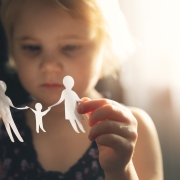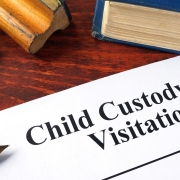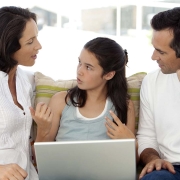Posts
Divorce with Children – An Interview with Ben Stich
I was honored to be interviewed by Natalie Armstrong from the Marketing Resolution YouTube Channel on Tuesday from among the many stellar divorce and family mediators she knows. The interview was fun, brief, and hopefully informative for viewers interested in learning about family and divorce mediation. Check it out!
Divorcing with Children: An Interview with Divorce Mediator Ben Stich
When there is a divorce with children an effective separation agreement can set the stage for better outcomes for kids. One of her goals from the interview was to help viewers learn how mediation helps parents craft a child-centered custody arrangement and parenting plan.
About Mediator Natalie Armstrong-Motin
Natalie is a fierce advocate of dispute resolution practices. She promotes divorce mediators and dispute resolution experts from a range of industries, including family law. Her goal is to increase awareness of peace-making resources that exist throughout the world. To that end, her YouTube Channel is a volunteer venture and does not produce income for her or the interviewee.
To learn more about Natalie’s work promoting mediation professionals check out The Marketing Resolution YouTube channel.
Her channel is all about the resolution industry. It highlights the providers – the mediators, arbitrators, collaborators, facilitators, trainers, authors, speakers, bloggers, organizations, associations, and laws. Contact Natalie Armstrong-Motin at Marketing Resolution
How Custody Works in Massachusetts
The word “custody” conjures ugly divisive images for many people. This post will clarify how child custody works in Massachusetts.
Two Types of Custody
In Massachusetts there is legal custody and physical custody. Legal custody involves a parent’s legal right to making decisions for their child. Physical custody relates to time the child lives with each parent.
How Legal Custody Works in Massachusetts
Legal custody is a parent’s right to make decisions for their child. In particular, having legal custody allows the parent to influence the child’s education, medical care, and emotional, moral, and religious development.
In practical terms, having legal custody allows a parent to weigh in on decisions like:
- Approving your child’s Individualized Education Plan
- Consenting to your child’s surgery
- Determining your child’s religious education plan
- Deciding if your child sees a therapist
In Massachusetts, parents either have Shared Legal Custody or one parent has Sole Legal Custody.
Shared legal custody is typical whereby both parents are continually involved with all major decisions related to their child. Sole legal custody, which is less common, is when only one parent has the legal rights and responsibilities of making these important final decisions.
How Physical Custody Works in Massachusetts
Physical custody indicates where the child lives. In Massachusetts, parents either have Shared Physical Custody or Sole Physical Custody.
Shared custody is when a child has periods of living with each parent, so the child has frequent, continuous contact with both parents. Sole custody is when a child lives with one parent and is subject to reasonable parenting time with the other parent.
In practical terms, parents negotiate their parenting schedule. In divorce mediation, the outcome of the agreed upon parenting schedule determines the formal custody status.
How to Figure Out a Parenting Plan
During divorce mediation the mediator will guide parents through questions to consider in order to negotiate a parenting plan that serves the best interests of the child. There are a number of helpful resources mediators can provide that describe best practices, such as Planning for Shared Parenting which is endorsed by the Commonwealth of Massachusetts for parents living apart.
How Does “Custody” Work Bottom Line
The word “custody” makes many people feel uncomfortable. During mediation the mediator can help you navigate this without an over-emphasis on divisive language. A good divorce mediator will help parents figure out two important issues that can be done without an over-emphasis on the “custody” word:
- How to make decisions for their child (i.e. legal custody) and,
- How to craft a parenting schedule for their child (i.e. physical custody)
Contact Ben Stich for a free mediation consultation if you would like to learn more.
This article “How Does Custody Work in Massachusetts” contains general publicly available legal information and does not contain legal advice. This article is not a substitute for an attorney or law firm. The law is complex and changes often. For legal advice, contact a mediation-friendly attorney.
Your Kids and Divorce: Mediating a Child-First Divorce
What do kids and divorce negotiations have to do with one another?
A lot! (for parents).
Thinking about your kids could be the best decision you’ll make in your divorce negotiation.
Your Kids’ Shoes
I recently wrapped up a mediation that was a model child-centered divorce.
The parents weren’t buddies. They didn’t spend a lot of time together. They disagreed a lot during mediation.
In fact, they didn’t particularly like each other.
But they love their kids, and despite the obvious personal tension between them they embraced their redefined relationship: co-parents for life.
And they realized that to make a great parenting plan they needed some perspective.
Kids and Divorce Mediation
What kind of perspective?
Your kids!
Some would ask what a child’s perspective has to do with divorce negotiations, so let me explain.
The degree to which your parenting plan meets your children’s needs can profoundly affect how well they adapt to divorce.
My divorce mediation clients worked hard to put themselves in their children’s shoes and consider their perspective when crafting the parenting schedule, holiday division, and the many other parts of their parenting plan.
And the way in which they did this was usually subtle. They’d ask questions like:
She has all these activities…what kind of drop-off arrangement do we think would be least stressful for her?
You know, she’s really worried about the dog…would you ever consider having her bring the dog with her when she’s at your place?
He’s really anxious and worried about upsetting either of us…can we figure out how to explain the plan to him together? Maybe we can have a family meeting?
You know his friends are his life…we need to figure out a way to make sure we’re on the same page about play dates and birthday parties…
I think alternating Christmas, which is what I’d personally like to do, would be devastating for them…how can we make this work so it’s still special for them and not impossible for us?
Your Kids and Divorce…
Walking in your kids’ shoes for a moment can take the focus away from your spousal conflict and place it on what binds you most meaningfully: your children.
And will lead to a better child-centered parenting plan.
How to Divorce in Massachusetts Using Mediation: An Interview on WCRN
I had the great fortune to be interviewed by Attorney Allen Margulis of the Total Counselor Show on WCRN on July 31st about how to divorce in Massachusetts. During the hour-long interview we discussed the different ways to get divorced in Massachusetts, with a particularly emphasis on divorce mediation.
I shared one of my favorite mediation stories: Two parents came to me after spending six figures on their contested divorce process without any progress…and resolved the entire divorce in under $5,000 total mediation fees!
In addition to the financial and time benefits to mediation we discussed at length the destructive impact parental conflict has on child well-being, and how mediation can help parents craft great parenting plans. We also reviewed the role mediation can play to help with a range of family conflicts outside the context of divorce.
I hope you enjoy listening to three of the segments I have linked below!
Segment 1: How to Divorce in Massachusetts
Segment 2: How to Divorce in Massachusetts
Segment 3: How to Divorce in Massachusetts
A big thank you to Allen for hosting me on the show. Attorney Margulis is a respected Estate, Tax, Real Estate and Business Planning. Allen considers himself a tax-centric lawyer. He provides his clients with a complete and comprehensive strategic plan aimed at achieving their goals and objectives. He dedicates himself to providing all of his clients with superior service. Allen has 26 years experience in tax and accounting and 16 years in law. To contact Attorney Margulis click here.
For a free mediation consultation with mediator Ben Stich click here.
How to Love Your Kids More Than Despise Your Ex
There is a family judge in Massachusetts who makes decisions for children of divorce every day. She has a sign hanging on her door that reads:
Do You Hate Your Ex More Than You Love Your Kids?
Provocative question, right?
You might be thinking “of course I don’t — that’s just ridiculous!” Maybe you are even offended by the suggestion.
So why then would a judge so brazenly post this message?
After all, the chances are that if you are separated or divorced you are working hard to do the best you can to protect your kids from any harm stemming from the breakup. Your intentions are probably in the right place.
Sadly, sometimes intentions are not enough. Too often negative unintended harm comes to children of divorce because of the conflict, tension, or even ill will that exists between exes.
How Parents Make the Effects of Divorce on Children of Divorce Even Worse
Since this article started by posing the judge’s provocative statement, let me ask another provocative set of questions: If divorced parents love their kids more than hate their ex, then why do so many co-parents…
- Complain on the phone to their friends about their ex within earshot of the kids, or….
- Fail to buy a Mother’s or Father’s day card for the child to give to the other parent, or…
- Dig for information from their child about the other parent’s social life, or…
- Roll their eyes when the child tells them about something the other parent said or did, or…
- Ask the child to choose between attending an activity with Mom or attending another equally enticing activity with Dad, or…
- Have their child pass messages on from one parent to the other parent, or…
- Argue at pick-up and drop-off with the ex, or…
- Fight endlessly over a parenting schedule leaving the child in uncertain limbo about the future plan, or…
- Litigate endlessly to stick it to the ex, or…
Before you react defensively please take a breath. Seriously. I am NOT suggesting you are a bad parent if you can relate to any of these examples. These are common behaviors among divorced parents and let’s admit it, the judge’s question contains quite a bit of hyperbole. But it certainly got your attention, right?
How Parents CAN Decrease the Negative Effects of Divorce on Children of Divorce
Now, let’s do a reframe. Let’s say that it is clear that a parent loves their kids more than they hate their ex, and we know that because they:
- Make sure to never complain about the parent within earshot of the children…
- Go out of the way to make sure their child honors the other parent’s birthday and Mother’s and Father’s Day
- Never use the children as a source to get information about the other parent…
- Listen attentively and without judgment when the children are talking about the other parent…
- Never ask the children to choose between Mom and Dad…
- Communicate directly with the parent rather than having the children pass messages back and forth…
- Behave politely with the other parent during pick-up and drop-off…
- Establish a parenting plan in a timely manner that is geared to the child’s best interest rather than the parent’s…
- Improve communication and decrease conflict by working with a divorce mediator, rather than litigate…
The bottom line is that kids of separated, divorced or never-married parents are hyper-aware of and sensitive to the relationship dynamics between their parents. When you get angry, frustrated, exasperated, furious, indignant and outraged at your ex, please remember this:
You Love Your Kids More Than You Hate Your Ex!
Remembering this could be the best thing you’ve ever done for your kids.
Please REPLY below to share other strategies that can minimize the negative effects for children of divorce!
Parenting Tips for How to Help Your Kids Resolve Conflict
It’s Halloween time.
Two brothers are upset because one of the two pumpkins had to be thrown out. Brothers did what brothers do: argue. They both wanted the remaining pumpkin to be their pumpkin.
Their mother tried her best to encourage them to share, to reprimand them, and even threatened to take the pumpkin away from both of them.
No luck.
She was at her wits end. The kids arguing would not stop.
Parenting Tips and Tricks
Their father was brought up to speed later that day. Taking a different approach to his kids arguing, he waited for a calm moment to sit the boys down and asked them why the pumpkin was so important to each of them.
After some encouragement and assurance the older one explained that he wanted to carve the pumpkin by himself. He had spent time thinking about the carving and in preparation had even drawn it out on paper. It was going to be so cool!
The younger one, sniffling, explained that he wanted to bake the pumpkin seeds like his teacher told him about. They were going to be so good!
Their father listened intently.
And then he said:
“So, you want to carve the pumpkin. And you want the seeds so you can bake them. I wonder if there is a way for each of you to get what you want with the same pumpkin? What do you think?”
Later that night, the older son carved the pumpkin. As he gutted the pumpkin he carefully placed the seeds in to a bowl. His younger brother worked with his mother to clean, salt and bake them.
Parent as Mediator: Teaching Kids How to Resolve Conflict
In mediation, the pumpkin is an example of a position a client may bring in to the session. The carving and baking are the interests that the father helped his kids figure out. This father was a great mediator!
He asked some questions, listened, and helped the kids brainstorm solutions that met both of their needs. This is exactly what any effective mediator will do to help resolve family conflict.
Focusing on the pumpkin alone would never have resulted in a win-win solution.
In what ways do you focus too much on the “pumpkins” in your life?
Comment below to share your take-away from this story!
Pages
Divorce with Children – An Interview with Ben Stich
I was honored to be interviewed by Natalie Armstrong from the Marketing Resolution YouTube Channel on Tuesday from among the many stellar divorce and family mediators she knows. The interview was fun, brief, and hopefully informative for viewers interested in learning about family and divorce mediation. Check it out!
Divorcing with Children: An Interview with Divorce Mediator Ben Stich
When there is a divorce with children an effective separation agreement can set the stage for better outcomes for kids. One of her goals from the interview was to help viewers learn how mediation helps parents craft a child-centered custody arrangement and parenting plan.
About Mediator Natalie Armstrong-Motin
Natalie is a fierce advocate of dispute resolution practices. She promotes divorce mediators and dispute resolution experts from a range of industries, including family law. Her goal is to increase awareness of peace-making resources that exist throughout the world. To that end, her YouTube Channel is a volunteer venture and does not produce income for her or the interviewee.
To learn more about Natalie’s work promoting mediation professionals check out The Marketing Resolution YouTube channel.
Her channel is all about the resolution industry. It highlights the providers – the mediators, arbitrators, collaborators, facilitators, trainers, authors, speakers, bloggers, organizations, associations, and laws. Contact Natalie Armstrong-Motin at Marketing Resolution
How Custody Works in Massachusetts
The word “custody” conjures ugly divisive images for many people. This post will clarify how child custody works in Massachusetts.
Two Types of Custody
In Massachusetts there is legal custody and physical custody. Legal custody involves a parent’s legal right to making decisions for their child. Physical custody relates to time the child lives with each parent.
How Legal Custody Works in Massachusetts
Legal custody is a parent’s right to make decisions for their child. In particular, having legal custody allows the parent to influence the child’s education, medical care, and emotional, moral, and religious development.
In practical terms, having legal custody allows a parent to weigh in on decisions like:
- Approving your child’s Individualized Education Plan
- Consenting to your child’s surgery
- Determining your child’s religious education plan
- Deciding if your child sees a therapist
In Massachusetts, parents either have Shared Legal Custody or one parent has Sole Legal Custody.
Shared legal custody is typical whereby both parents are continually involved with all major decisions related to their child. Sole legal custody, which is less common, is when only one parent has the legal rights and responsibilities of making these important final decisions.
How Physical Custody Works in Massachusetts
Physical custody indicates where the child lives. In Massachusetts, parents either have Shared Physical Custody or Sole Physical Custody.
Shared custody is when a child has periods of living with each parent, so the child has frequent, continuous contact with both parents. Sole custody is when a child lives with one parent and is subject to reasonable parenting time with the other parent.
In practical terms, parents negotiate their parenting schedule. In divorce mediation, the outcome of the agreed upon parenting schedule determines the formal custody status.
How to Figure Out a Parenting Plan
During divorce mediation the mediator will guide parents through questions to consider in order to negotiate a parenting plan that serves the best interests of the child. There are a number of helpful resources mediators can provide that describe best practices, such as Planning for Shared Parenting which is endorsed by the Commonwealth of Massachusetts for parents living apart.
How Does “Custody” Work Bottom Line
The word “custody” makes many people feel uncomfortable. During mediation the mediator can help you navigate this without an over-emphasis on divisive language. A good divorce mediator will help parents figure out two important issues that can be done without an over-emphasis on the “custody” word:
- How to make decisions for their child (i.e. legal custody) and,
- How to craft a parenting schedule for their child (i.e. physical custody)
Contact Ben Stich for a free mediation consultation if you would like to learn more.
This article “How Does Custody Work in Massachusetts” contains general publicly available legal information and does not contain legal advice. This article is not a substitute for an attorney or law firm. The law is complex and changes often. For legal advice, contact a mediation-friendly attorney.
Your Kids and Divorce: Mediating a Child-First Divorce
What do kids and divorce negotiations have to do with one another?
A lot! (for parents).
Thinking about your kids could be the best decision you’ll make in your divorce negotiation.
Your Kids’ Shoes
I recently wrapped up a mediation that was a model child-centered divorce.
The parents weren’t buddies. They didn’t spend a lot of time together. They disagreed a lot during mediation.
In fact, they didn’t particularly like each other.
But they love their kids, and despite the obvious personal tension between them they embraced their redefined relationship: co-parents for life.
And they realized that to make a great parenting plan they needed some perspective.
Kids and Divorce Mediation
What kind of perspective?
Your kids!
Some would ask what a child’s perspective has to do with divorce negotiations, so let me explain.
The degree to which your parenting plan meets your children’s needs can profoundly affect how well they adapt to divorce.
My divorce mediation clients worked hard to put themselves in their children’s shoes and consider their perspective when crafting the parenting schedule, holiday division, and the many other parts of their parenting plan.
And the way in which they did this was usually subtle. They’d ask questions like:
She has all these activities…what kind of drop-off arrangement do we think would be least stressful for her?
You know, she’s really worried about the dog…would you ever consider having her bring the dog with her when she’s at your place?
He’s really anxious and worried about upsetting either of us…can we figure out how to explain the plan to him together? Maybe we can have a family meeting?
You know his friends are his life…we need to figure out a way to make sure we’re on the same page about play dates and birthday parties…
I think alternating Christmas, which is what I’d personally like to do, would be devastating for them…how can we make this work so it’s still special for them and not impossible for us?
Your Kids and Divorce…
Walking in your kids’ shoes for a moment can take the focus away from your spousal conflict and place it on what binds you most meaningfully: your children.
And will lead to a better child-centered parenting plan.
How to Divorce in Massachusetts Using Mediation: An Interview on WCRN
I had the great fortune to be interviewed by Attorney Allen Margulis of the Total Counselor Show on WCRN on July 31st about how to divorce in Massachusetts. During the hour-long interview we discussed the different ways to get divorced in Massachusetts, with a particularly emphasis on divorce mediation.
I shared one of my favorite mediation stories: Two parents came to me after spending six figures on their contested divorce process without any progress…and resolved the entire divorce in under $5,000 total mediation fees!
In addition to the financial and time benefits to mediation we discussed at length the destructive impact parental conflict has on child well-being, and how mediation can help parents craft great parenting plans. We also reviewed the role mediation can play to help with a range of family conflicts outside the context of divorce.
I hope you enjoy listening to three of the segments I have linked below!
Segment 1: How to Divorce in Massachusetts
Segment 2: How to Divorce in Massachusetts
Segment 3: How to Divorce in Massachusetts
A big thank you to Allen for hosting me on the show. Attorney Margulis is a respected Estate, Tax, Real Estate and Business Planning. Allen considers himself a tax-centric lawyer. He provides his clients with a complete and comprehensive strategic plan aimed at achieving their goals and objectives. He dedicates himself to providing all of his clients with superior service. Allen has 26 years experience in tax and accounting and 16 years in law. To contact Attorney Margulis click here.
For a free mediation consultation with mediator Ben Stich click here.
How to Love Your Kids More Than Despise Your Ex
There is a family judge in Massachusetts who makes decisions for children of divorce every day. She has a sign hanging on her door that reads:
Do You Hate Your Ex More Than You Love Your Kids?
Provocative question, right?
You might be thinking “of course I don’t — that’s just ridiculous!” Maybe you are even offended by the suggestion.
So why then would a judge so brazenly post this message?
After all, the chances are that if you are separated or divorced you are working hard to do the best you can to protect your kids from any harm stemming from the breakup. Your intentions are probably in the right place.
Sadly, sometimes intentions are not enough. Too often negative unintended harm comes to children of divorce because of the conflict, tension, or even ill will that exists between exes.
How Parents Make the Effects of Divorce on Children of Divorce Even Worse
Since this article started by posing the judge’s provocative statement, let me ask another provocative set of questions: If divorced parents love their kids more than hate their ex, then why do so many co-parents…
- Complain on the phone to their friends about their ex within earshot of the kids, or….
- Fail to buy a Mother’s or Father’s day card for the child to give to the other parent, or…
- Dig for information from their child about the other parent’s social life, or…
- Roll their eyes when the child tells them about something the other parent said or did, or…
- Ask the child to choose between attending an activity with Mom or attending another equally enticing activity with Dad, or…
- Have their child pass messages on from one parent to the other parent, or…
- Argue at pick-up and drop-off with the ex, or…
- Fight endlessly over a parenting schedule leaving the child in uncertain limbo about the future plan, or…
- Litigate endlessly to stick it to the ex, or…
Before you react defensively please take a breath. Seriously. I am NOT suggesting you are a bad parent if you can relate to any of these examples. These are common behaviors among divorced parents and let’s admit it, the judge’s question contains quite a bit of hyperbole. But it certainly got your attention, right?
How Parents CAN Decrease the Negative Effects of Divorce on Children of Divorce
Now, let’s do a reframe. Let’s say that it is clear that a parent loves their kids more than they hate their ex, and we know that because they:
- Make sure to never complain about the parent within earshot of the children…
- Go out of the way to make sure their child honors the other parent’s birthday and Mother’s and Father’s Day
- Never use the children as a source to get information about the other parent…
- Listen attentively and without judgment when the children are talking about the other parent…
- Never ask the children to choose between Mom and Dad…
- Communicate directly with the parent rather than having the children pass messages back and forth…
- Behave politely with the other parent during pick-up and drop-off…
- Establish a parenting plan in a timely manner that is geared to the child’s best interest rather than the parent’s…
- Improve communication and decrease conflict by working with a divorce mediator, rather than litigate…
The bottom line is that kids of separated, divorced or never-married parents are hyper-aware of and sensitive to the relationship dynamics between their parents. When you get angry, frustrated, exasperated, furious, indignant and outraged at your ex, please remember this:
You Love Your Kids More Than You Hate Your Ex!
Remembering this could be the best thing you’ve ever done for your kids.
Please REPLY below to share other strategies that can minimize the negative effects for children of divorce!
Parenting Tips for How to Help Your Kids Resolve Conflict
It’s Halloween time.
Two brothers are upset because one of the two pumpkins had to be thrown out. Brothers did what brothers do: argue. They both wanted the remaining pumpkin to be their pumpkin.
Their mother tried her best to encourage them to share, to reprimand them, and even threatened to take the pumpkin away from both of them.
No luck.
She was at her wits end. The kids arguing would not stop.
Parenting Tips and Tricks
Their father was brought up to speed later that day. Taking a different approach to his kids arguing, he waited for a calm moment to sit the boys down and asked them why the pumpkin was so important to each of them.
After some encouragement and assurance the older one explained that he wanted to carve the pumpkin by himself. He had spent time thinking about the carving and in preparation had even drawn it out on paper. It was going to be so cool!
The younger one, sniffling, explained that he wanted to bake the pumpkin seeds like his teacher told him about. They were going to be so good!
Their father listened intently.
And then he said:
“So, you want to carve the pumpkin. And you want the seeds so you can bake them. I wonder if there is a way for each of you to get what you want with the same pumpkin? What do you think?”
Later that night, the older son carved the pumpkin. As he gutted the pumpkin he carefully placed the seeds in to a bowl. His younger brother worked with his mother to clean, salt and bake them.
Parent as Mediator: Teaching Kids How to Resolve Conflict
In mediation, the pumpkin is an example of a position a client may bring in to the session. The carving and baking are the interests that the father helped his kids figure out. This father was a great mediator!
He asked some questions, listened, and helped the kids brainstorm solutions that met both of their needs. This is exactly what any effective mediator will do to help resolve family conflict.
Focusing on the pumpkin alone would never have resulted in a win-win solution.
In what ways do you focus too much on the “pumpkins” in your life?
Comment below to share your take-away from this story!






